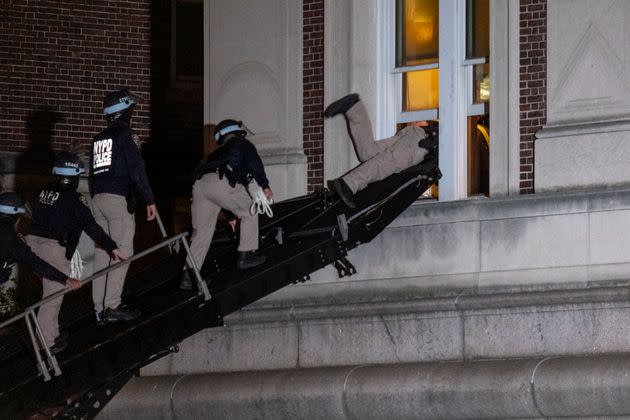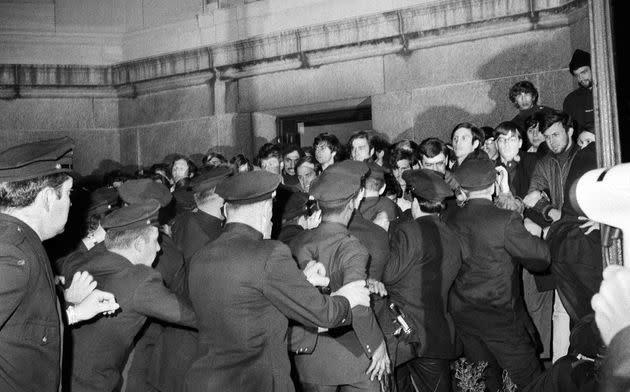Columbia Defends Using NYPD Against Students Protesting War In Gaza

Columbia University defended its decision this week to call New York City police to respond to students who were protesting the war in Gaza and demanding that the university divest from Israel.
In a statement posted online, university President Minouche Shafik said the students’ occupation of Columbia’s Hamilton Hall on Tuesday was a “drastic escalation” of the campus protests that have been ongoing for weeks.
The occupation “pushed the university to the brink, creating a disruptive environment for everyone and raising safety risks to an intolerable level,” Shafik wrote.
The school requested help from the New York Police Department on Tuesday night. Police, some with guns drawn, cleared Hamilton Hall with zip ties and riot shields and swept through student encampments on campus, arresting about 100 protesters. Shafik has asked police to remain on campus until May 17.
“Columbia has a long and proud tradition of protest and activism on many important issues such as the Vietnam War, civil rights, and the anti-apartheid struggle in South Africa,” Shafik’s statement reads. “Today’s protesters are also fighting for an important cause, for the rights of Palestinians and against the humanitarian tragedy in Gaza. They have many supporters in our community and have a right to express their views and engage in peaceful protest.”
Students were protesting Israel’s attacks on Gaza, part of a military campaign that began in October after Hamas militants killed some 1,200 people in Israel and took about 250 people hostage. Since then, Israeli forces have killed more than 34,000 people in Gaza, including thousands of women and children. Francesca Albanese, the United Nations special rapporteur tasked with monitoring the Palestinian territories, argued in March that there are “reasonable grounds” to believe Israel’s actions amount to genocide.
On Monday, Shafik said in a statement that Columbia will not divest from Israel.
Some people on social media pointed out the irony of remembering past protests by Columbia students while calling the police on present-day demonstrators.
The Columbia Spectator, New York, Tuesday, April 30, 1968: https://t.co/4sNEDQ38Kspic.twitter.com/2GO9MwUdx7
— philip lewis (@Phil_Lewis_) May 1, 2024
On the same day in 1968, the school’s student newspaper reported that Columbia had called in nearly 1,000 police officers to contain people on campus protesting the Vietnam War. The raid led to 700 arrests and 100 injuries.

In 2008, Columbia’s then-President Lee Bollinger said it was a mistake to bring in police to end the protests in 1968.
“You simply do not bring police onto a campus,” Bollinger said.
